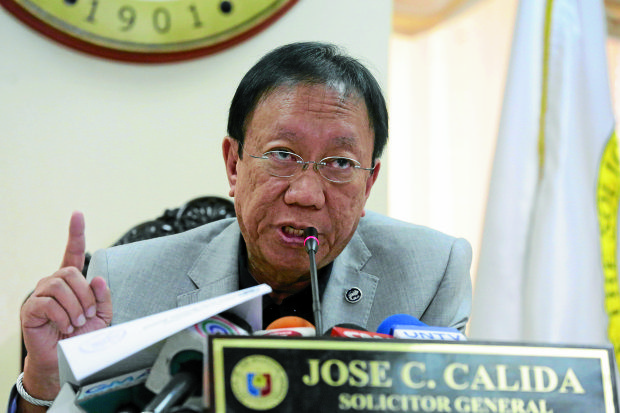SC asked to quash petitions vs Congress resolutions backing martial law

Solicitor General Jose Calida. GRIG C. MONTEGRANDE / Philippine Daily Inquirer FILE PHOTO
The Office of the Solicitor General (OSG) on Tuesday asked the Supreme Court to dismiss consolidated petitions asking to nullify separate House and Senate resolutions declaring support for Proclamation 216 or President Rodrigo Duterte’s 60-day martial law declaration in Mindanao.
In a 40-page comment, the OSG, through the government’s lead government counsel, Solicitor General Jose Calida, also asked the high court to dismiss the claim of petitioners that the Constitution requires a joint review of the martial law proclamation.
“While not mandatory, Congress neither procrastinated nor reneged on its sworn duties when it heard the basis of Proclamation No. 216 through a closed-door meeting with the country’s top military officials, and thereafter collectively voiced its support through the issuances of their respective resolutions,” Calida explained. “Indeed, the Congress even went beyond its constitutional duty respecting the proclamation or suspension.”
“Petitioners should not be allowed to use the Honorable Supreme Court in testing the autonomy and independence of Congress as a co-equal branch and in interfering with its discretionary acts as granted by the Constitution,” Calida said.
READ: Solgen: SC is the final arbiter on martial law
Article continues after this advertisement“Prudence and respect for the co-equal departments of the government dictate that the Honorable Supreme Court should be cautious in entertaining actions that assail the constitutionality of the acts of the Executive or the Legislative department,” he added.
Article continues after this advertisementThe petitions were filed separately before the Supreme Court. The group of petitioners was led by former senators Rene Saguisag and Wigberto Tañada.
Calida pointed out that under Article VII, Section 18 of the 1987 Constitution, a joint voting is needed only if the proclamation will be revoked or extended.
“A plain reading of the Constitution will readily illustrate that it does not impose a duty upon Congress to convene in joint session to determine the validity of the declaration of martial law and suspension of the privilege of the writ of habeas corpus. It is only in cases of revocation or extension of the proclamation or suspension that Congress is required to vote jointly,” he stressed.
“Verily, there is no need to vote jointly to approve or affirm something which is already in full force or effect. Joint voting is only mandatory when the action is revocation or extension,” Calida said.
The Solicitor General further argued that the SC has no power to issue the mandamus sought by petitioners, citing the separation of powers of the judiciary and the legislature as coequal branches.
“The matter of affirming, ratifying or not revoking the declaration of martial law and even the manner by which it is done is left and fully within the power, authority and discretion of Congress over which the Supreme Court has no power,” he stressed.
“It is clear that under the separation of powers, ‘courts may not intervene in the internal affair of the legislature’; it is not within the province of courts to direct Congress how to do its work,” Calida added.
Earlier, the SC heard in oral arguments three other consolidated petitions filed by opposition lawmakers led by Rep. Edcel Lagman, local Mindanao leaders led by Lumad leader Eufemia Campos Cullamat and a group of women from Marawi led by Norkaya Mohamad seeking to strike down Proclamation No. 216.
READ: No sufficient factual basis for Duterte’s martial law, says Lagman
The high court, which is required by the Constitution to resolve petitioners against martial law declaration within 30 days from filing, is set to rule on these petitions on July 4. IDL/rga